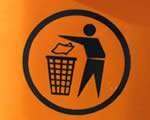 Go to main content
Go to main content
Archive Website of the UK government
Please note that this website has a UK government accesskeys system.
Main menu
Page menu
Environment and greener living

Reducing waste, reusing and repairing

Recycling can help save materials and energy, but cutting down on waste in the first place is even better. Taking your own bag when you go shopping can help. You can also repair broken items and find a good home for anything you don't want anymore.
The wider issue
Making new products uses energy and raw materials. As a general rule, reusing or repairing things rather than buying new will:
- help to keep valuable materials out of landfill sites
- use less energy than making new products, helping to tackle climate change
There are some exceptions. Old appliances like boilers and fridge-freezers use much more energy than new ones. If you need more advice, contact your local Energy Efficiency Advice Centre on 0800 512012.
Reducing waste
Waste and recycling opening times

Find opening times and locations of recycling centres near you
Nearly a fifth of household waste is packaging from retail purchases. Shopping carefully can help cut down on this waste. You could think about:
- taking your own bag when you go shopping, to help reduce the 10 billion plastic bags that are handed out by supermarkets each year
- registering with the Mailing Preference Service to avoid unwanted junk mail being sent to your home
- trying not to waste food; the average UK household spends £424 a year on food which is thrown away
- avoiding products with unnecessary packaging
- choosing reusable products
Repair
Some household items, including computers, electrical equipment and furniture, can be repaired. Search online or in your local phone book for repair services in your area.
Reuse
Many items can be reused, including mobile phones, computers, printer cartridges, leftover paint and clothes. Even if you have finished with something, someone else will often be able to use it. National charity organisations, local charity shops, internet auction sites and free exchange schemes may be able to reuse your unwanted items.
For some ideas on how to reduce your household waste visit the My Zero Waste website. You can also contribute your top tips for reusing items and reducing the amount that goes into landfill.
Computers
There are a large number of organisations throughout the UK that will accept unwanted computer equipment and repair or recycle it. Many of them are charities that provide benefits to the local community.
Furniture
Unwanted or broken furniture can be reused, mended or recycled. The Furniture Re-use Network can put you in touch with local schemes that pass on furniture and appliances to low income families. Vintage and second-hand shops are a popular choice if you're looking for new furniture or want to get rid of old furniture in good condition.
You can only buy, sell or give away second-hand upholstered (padded) furniture, like sofas, if it has the original permanent fire safety label attached. Otherwise, it might not meet fire safety standards. For more information, see the Department for Business, Innovation and Skills (BIS) website.
Paint
Try not to buy more paint than you need. More than 300 million litres of paint are bought each year and a significant amount never gets used. Leftover paint can be donated to a national network of paint reuse organisations, or disposed of safely through your local council.
Books, DVDs and CDs
Second-hand books, CDs and DVDs can be bought and sold online, or taken to your local charity shop.
 Facebook
Facebook Twitter
Twitter StumbleUpon
StumbleUpon Delicious
Delicious Reddit
Reddit
